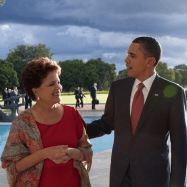Brazilian President Dilma Rousseff issued a blunt challenge to President Barack Obama when he arrived in Brazil to kick off his first visit to Latin America this past week: no more "empty rhetoric" about partnership between her country and the United States. Whether Washington can meet this standard, however, remains to be seen. Certainly, during this visit, no major initiatives were unveiled; no dramatic vision of a future U.S.-Brazilian entente was presented; and no grand gesture -- such as a compromise on the thorny trade issues that continue to hamper commercial ties between the two countries -- was magnanimously offered by Obama as a sign of American goodwill.
The Obama administration's defenders can point, with some justification, to the unfolding Libyan crisis as sufficient cause for the president's distracted focus. But Obama's foreign policy team has had more than two years to prepare for this first visit. And even before the trip started, there were indications that it would be a repeat of Obama's "salesman-in-chief" tour of South Asia last year. Indeed, the White House Web site described the purpose of the president's visit as "promoting American exports."
But Obama spoke largely in generalities during his time in Brazil. Announcing that Petrobras has been cleared to drill in the Gulf of Mexico and that the Export-Import Bank is extending a $3 billion credit for Brazilians to purchase more U.S. goods and services, and pledging to increase security cooperation and promoting "green energy" for the Olympics and the World Cup are all important projects, to be sure. But they don't add up to a compelling vision of a transformative relationship between the Western Hemisphere's two largest democracies and its two largest economies.

